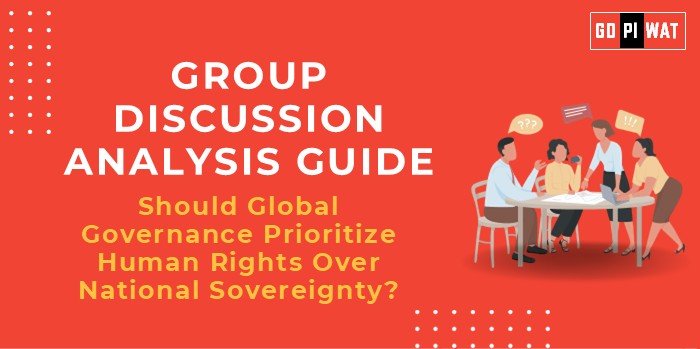📋 Group Discussion Analysis Guide
🌍 Topic: Should Global Governance Prioritize Human Rights Over National Sovereignty?
💡 Introduction to the Topic
🌱 Context: The tension between human rights and national sovereignty has long been a pivotal issue in international relations. In the wake of conflicts, humanitarian crises, and autocratic governance, this debate has gained renewed urgency.
📜 Background: The concept of sovereignty originates from the Treaty of Westphalia (1648), emphasizing state control over internal affairs. Contrastingly, the Universal Declaration of Human Rights (1948) marked a global consensus on fundamental rights transcending borders.
📊 Quick Facts and Key Statistics
- 📜 UN Charter: Sovereignty recognized under Article 2, balanced by Article 1’s aim to promote human rights.
- 🌍 Refugee Crisis (2023): Over 35 million refugees globally, highlighting state failures in human rights protection.
- 📈 Global Support for Rights Interventions: A 2022 Pew Research survey revealed 68% of respondents in liberal democracies supported interventions in human rights abuses.
🌍 Stakeholders and Their Roles
- 🏛️ United Nations: Promotes international law and coordinates responses to human rights violations.
- 🏢 Sovereign States: Responsible for internal governance and upholding citizens’ rights.
- 🌐 NGOs (e.g., Amnesty International): Monitor and advocate for human rights globally.
- 🤝 Regional Alliances (e.g., EU, AU): Facilitate collective decision-making in regional crises.
🏆 Achievements and Challenges
🌟 Achievements:
- ✔️ R2P (Responsibility to Protect): Prevented genocide in Kenya (2007-2008).
- ⚖️ International Criminal Court: Prosecuted war crimes, promoting accountability.
- 🕊️ UN Peacekeeping Missions: Reduced violence in post-conflict zones like Liberia.
⚠️ Challenges:
- ⛔ Sovereignty Conflicts: Rejections of external interventions by states like Myanmar and Syria.
- 📉 Selective Intervention: Bias in global governance due to political interests.
- 🔍 Enforcement Gaps: Weak compliance mechanisms for international law.
🌍 Global Comparisons:
- ✅ Successful Cases: Kosovo’s independence was supported internationally to safeguard rights.
- ❌ Failures: The Rohingya crisis highlights international inaction due to sovereignty concerns.
📜 Case Studies:
- Rwanda (1994): International failure to intervene led to genocide.
- Libya (2011): NATO-led intervention was controversial despite UN approval.
✨ Structured Arguments for Discussion
- 💬 Supporting Stance: “Prioritizing human rights aligns with universal moral obligations and enhances global stability.”
- ⚖️ Opposing Stance: “Respecting sovereignty is essential to maintaining international order and preventing misuse of intervention.”
- 🔄 Balanced Perspective: “While sovereignty is crucial, human rights violations that threaten peace warrant international action under clear mandates.”
🎯 Effective Discussion Approaches
📖 Opening Approaches:
- 🌟 Quote: “Human rights are the foundation of freedom, justice, and peace in the world – Eleanor Roosevelt.”
- 📜 Case Study Opening: “The genocide in Rwanda reminds us of the cost of respecting sovereignty over human rights.”
🔄 Counter-Argument Handling:
- 📜 Highlight cases of misuse of sovereignty to justify abuse.
- ⚙️ Argue for multilateral approaches to reduce intervention biases.
📈 Strategic Analysis of Strengths and Weaknesses
- 💪 Strengths: Encourages ethical global policies, promotes peace and stability.
- ⚠️ Weaknesses: Risks undermining state authority, potential for misuse.
- 💡 Opportunities: Multilateral frameworks for consensus-based interventions.
- 🚨 Threats: Escalating geopolitical tensions, selective application of laws.
📚 Connecting with B-School Applications
- 🌟 Real-World Applications: Study of global governance frameworks can inspire projects on ethical leadership or public policy.
- 💬 Sample Interview Questions:
- “What role should multinational corporations play in upholding human rights?”
- “Can economic sanctions effectively enforce human rights globally?”
- 📖 Insights for Students:
- Analyzing governance models can inform strategies for inclusive leadership.
- Understanding the balance between ethics and policy is crucial for decision-making.


